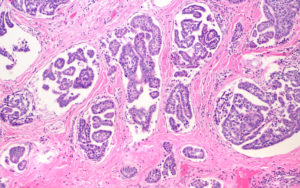Biopsy Spotlight: Inflammatory Mammary Gland Carcinoma
Erin Edwards, DVM, MS, DACVP
Mammary gland tumors are diagnosed on a daily basis at TVMDL. These tumors occur in both canine and feline patients and can be benign (adenomas) or malignant (carcinomas). They are seen most often in intact females. Inflammatory mammary gland carcinoma is a unique entity that occurs infrequently in dogs and is seen in humans as well. Recently, TVMDL has diagnosed two cases of this condition in dogs.
Despite the name of the tumor, inflammatory mammary gland carcinomas have little to no inflammation histologically. The tumor is so-named due to the clinical presentation of these animals. These dogs typically present to the clinician with physical signs that suggest inflammation, including swelling, redness, heat, and edema of the mammary glands, often resembling mastitis. Histologically, this tumor contains numerous dilated lymphatic vessels that are filled with luminal clusters of metastatic tumor cells. Sometimes this feature is so prominent that more neoplastic cells are seen within lymphatic vessels than within the mammary gland tissue itself. The plugging of these lymphatic vessels by neoplastic emboli results in the clinical signs that mimic inflammation. Unfortunately, inflammatory mammary gland carcinoma is the most malignant type of mammary gland tumor diagnosed in dogs and carries a poor prognosis.
To learn more about this case, contact Dr. Erin Edwards, veterinary pathologist at the College Station laboratory. For more information about TVMDL’s test catalog, visit tvmdl.tamu.edu.
